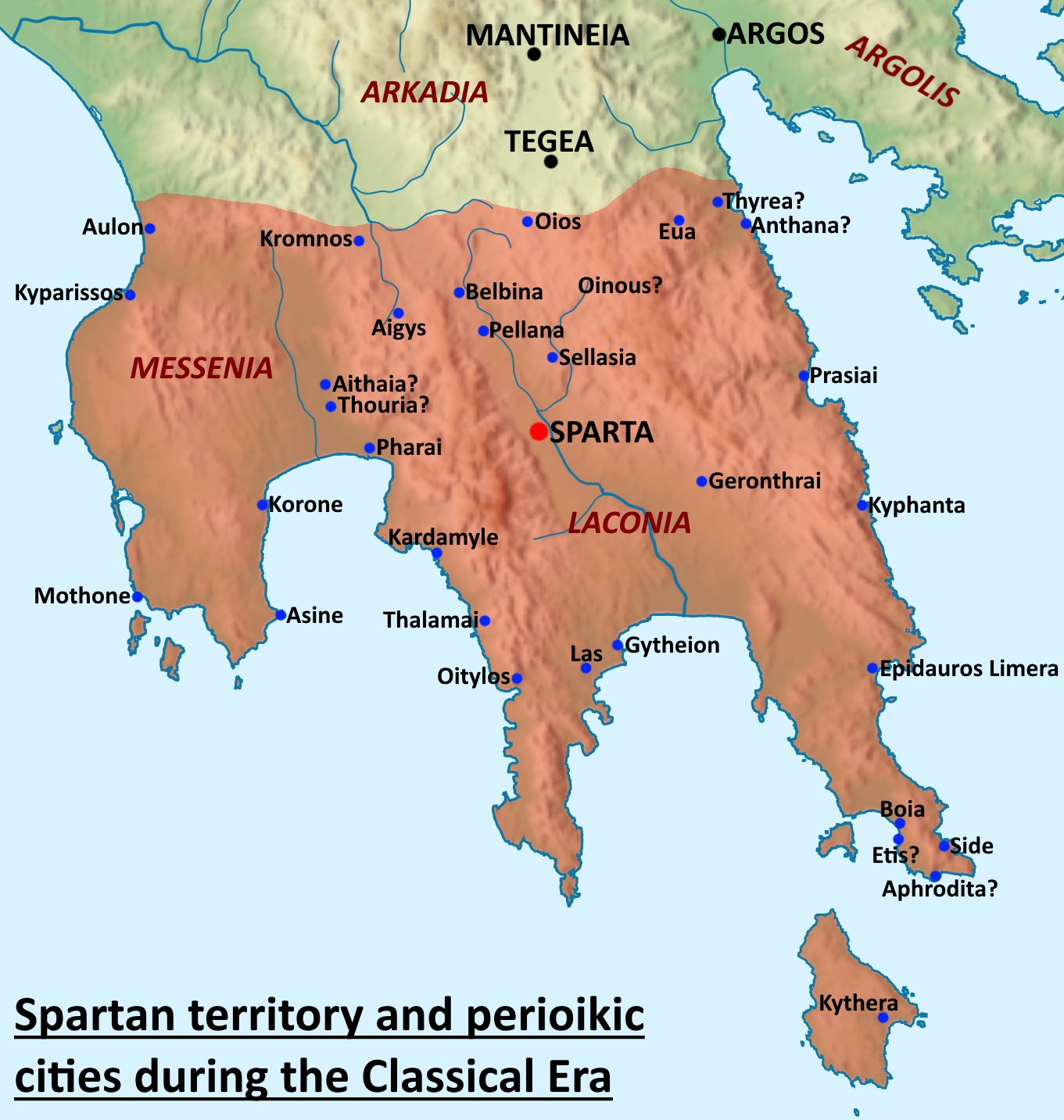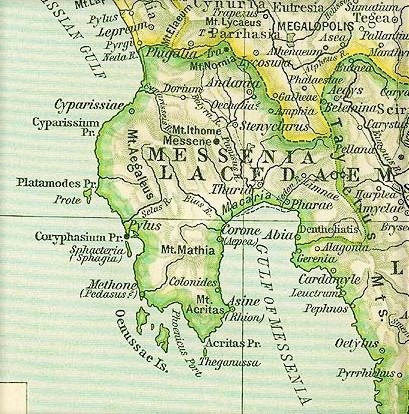|
Perioeci
The Perioeci or Perioikoi (, ) were the second-tier citizens of the ''polis'' of Sparta until 200 BC. They lived in several dozen cities within Spartan territories (mostly Laconia and Messenia), which were dependent on Sparta. The ''perioeci'' only had political rights in their own city, while the course of the Spartan state exclusively belonged to Spartan citizens, or Spartiates. The name ''perioeci'' roughly means "those dwelling around/nearby", deriving from , ''peri'', "around", and , ''oîkos'', "dwelling, house". ''Perioeci'' and Spartans were collectively called the ''Lakedaimonians''. They had a central role in the Spartan economy, controlling commerce and business, as well as being responsible for crafts and manufacturing, including producing the weapons and armour of the Spartan army, as the higher-ranking Spartan citizens considered all commercial and money-making activities to be unworthy of them. The ''perioeci'' were also the only people allowed to freely travel o ... [...More Info...] [...Related Items...] OR: [Wikipedia] [Google] [Baidu] |
Polis
Polis (: poleis) means 'city' in Ancient Greek. The ancient word ''polis'' had socio-political connotations not possessed by modern usage. For example, Modern Greek πόλη (polē) is located within a (''khôra''), "country", which is a πατρίδα (patrida) or "native land" for its citizens. In ancient Greece, the polis was the native land; there was no other. It had a constitution and demanded the supreme loyalty of its citizens. χώρα was only the countryside, not a country. Ancient Greece was not a sovereign country, but was territory occupied by Hellenes, people who claimed as their native language some dialect of Ancient Greek. Poleis did not only exist within the area of the modern Republic of Greece. A collaborative study carried by the Copenhagen Polis Centre from 1993 to 2003 classified about 1,500 settlements of the Archaic and Classical ancient-Greek-speaking population as poleis. These ranged from the Caucasus to Southern Spain, and from Southern Russia to ... [...More Info...] [...Related Items...] OR: [Wikipedia] [Google] [Baidu] |
Spartan Territory Before 371 BC
Sparta was a prominent city-state in Laconia in ancient Greece. In antiquity, the city-state was known as Lacedaemon (), while the name Sparta referred to its main settlement in the Evrotas Valley, valley of Evrotas (river), Evrotas river in Laconia, in southeastern Peloponnese. Around 650 BC, it rose to become the dominant military land-power in ancient Greece. Sparta was recognized as the leading force of the unified Greek military during the Greco-Persian Wars, in rivalry with the rising naval power of Classical Athens, Athens. Sparta was the principal enemy of History of Athens, Athens during the Peloponnesian War (431–404 BC), from which it emerged victorious after the Battle of Aegospotami. The decisive Battle of Leuctra against Thebes, Greece, Thebes in 371 BC ended the Spartan hegemony, although the city-state maintained its Independence, political independence until its forced integration into the Achaean League in 192 BC. The city nevertheless recovered m ... [...More Info...] [...Related Items...] OR: [Wikipedia] [Google] [Baidu] |
Spartiate
A Spartiate (, ''Spartiátēs'') or ''Homoios'' (pl. ''Homoioi'', , "alike") was an elite full-citizen men of the ancient Greek city-state of Sparta. Spartiate-class men (including boys) were a small minority: estimates are that they made up between 1/10 and 1/32 of the population, with the proportion decreasing over time; the vast majority of the people of Sparta were helots (slaves). Spartan citizenship was restricted to adult men without metic ancestry, as in most Greek poleis. Spartiate-class women could not hold citizenship but were eligible to marry Spartiates, and their sons could become Spartiates. After the First Messenian War, the mass enslavement of the Messenian population created a slave society (60-79% slaves; by contrast, US slave states generally had 30-65%). This society was recognized as unusual by both modern historians and contemporary non-Spartans. Spartiate-class people came to be barred from work by law and strong social norms and were supported by th ... [...More Info...] [...Related Items...] OR: [Wikipedia] [Google] [Baidu] |
Helots
The helots (; , ''heílotes'') were a subjugated population that constituted a majority of the population of Laconia and Messenia – the territories ruled by Sparta. There has been controversy since antiquity as to their exact characteristics, such as whether they constituted an Ancient Greek tribe, a social class, or both. For example, Critias described helots as "slaves to the utmost", whereas according to Pollux, they occupied a status "between free men and slaves". Tied to the land, they primarily worked in agriculture as a majority and economically supported the Spartan citizens. The proportion of helots in relation to Spartan citizens varied throughout the history of the Spartan state; according to Herodotus, there were seven helots for each of the 5,000 Spartan soldiers at the time of the Battle of Plataea in 479 BC. Thus the need to keep the helot population in check and to prevent rebellion were major concerns of the Spartans. Helots were ritually mistreated and ... [...More Info...] [...Related Items...] OR: [Wikipedia] [Google] [Baidu] |
Neodamodes
The neodamodes (, ''neodamōdeis'') were helots freed after passing a time of service as hoplites in the Spartan army. The date of their first apparition is uncertain. Thucydides does not explain the origin of this special category. Jean Ducat, in his book ''Les Hoplites'' (1990), concludes that their statute "was largely inspired by the measures dictated concerning the Brasidians", i.e. the helots freed after taking part in the expedition of Brasidas in 424 BC. Their existence is attested from 420 to 369 BC. They were part of Sparta's army and 2,000 of them are recorded taking part, for example, in Agesilaus II's campaign in Ionia between 396 and 394 BC. The name comes from the words νέος ''neos'', meaning "new", and ''dêmos'', meaning "''deme'' or territory". Differently from what is written by Hesychius of Alexandria, who brings together the neodamodes and the Athenian '' demotes'' (citizens of a deme), they never acquired full citizenship. The suffix -ωδης ''- ... [...More Info...] [...Related Items...] OR: [Wikipedia] [Google] [Baidu] |
Ancient Elis
Elis () or Eleia (; ; Elean: ; ) is an ancient district in Greece that corresponds to the modern regional unit of Elis. Elis is in southern Greece on the Peloponnese, bounded on the north by Achaea, east by Arcadia, south by Messenia, and west by the Ionian Sea. Over the course of the archaic and classical periods, the '' polis'' "city-state" of Elis controlled much of the region of Elis, most probably through unequal treaties with other cities; many inhabitants of Elis were Perioeci—autonomous free non-citizens. Perioeci, unlike other Spartans, could travel freely between cities. Thus the polis of Elis was formed. The local form of the name was Valis, or Valeia, and its meaning, in all probability was, "the lowland" (compare with the word "valley"). In its physical constitution Elis is similar to Achaea and Arcadia; its mountains are mere offshoots of the Arcadian highlands, and its principal rivers are fed by Arcadian springs. According to Strabo, the first ... [...More Info...] [...Related Items...] OR: [Wikipedia] [Google] [Baidu] |
First Messenian War
The First Messenian War was a war between Messenia_(ancient_region), Messenia and Sparta. It began in 743 BC and ended in 724 BC, according to the dates given by Pausanias (geographer), Pausanias. The war continued the rivalry between the Achaeans (tribe), Achaeans and the Dorians that had been initiated by the purported Return of the Heracleidae. Both sides utilized an explosive incident to settle the rivalry by full-scale war. The war was prolonged into 20 years. The result was a Spartan victory. Messenia was depopulated by emigration of the Achaeans to other states. Those who did not emigrate were reduced socially to helots, or serfs. Their descendants were held in hereditary servitude for centuries, until the collapse of the Spartan state in 370 BC. Dates Pausanias' standard dates Pausanias (geographer), Pausanias says that the opening campaign was a surprise attack on Ampheia by a Spartan force commanded by Alcmenes, List of kings of Sparta#Agiad dynasty, Agiad king of Spa ... [...More Info...] [...Related Items...] OR: [Wikipedia] [Google] [Baidu] |
Spartan Army
The Spartan army was the principal ground force of Sparta. It stood at the center of the ancient Greek city-state, consisting of citizens trained in the disciplines and honor of a warrior society.Connolly (2006), p. 38 Subjected to military drills since early manhood, the Spartans became one of the most feared and formidable military forces in the Greek world, attaining legendary status in their wars against Persia. At the height of Sparta's power—between the 6th and 4th centuries BC—other Greeks commonly accepted that "one Spartan was worth several men of any other state." 200px, Spartan helmet on display at the British Museum. The helmet has been damaged and the top has sustained a blow. Tradition states that the semi-mythical Spartan legislator Lycurgus first founded the iconic army. Referring to Sparta as having a "wall of men, instead of bricks," he proposed reforming the Spartan society to develop a military-focused lifestyle following "proper virtues" such as ... [...More Info...] [...Related Items...] OR: [Wikipedia] [Google] [Baidu] |
Politics (Aristotle)
''Politics'' (, ') is a work of political philosophy by Aristotle, a 4th-century BC Greek philosopher. At the end of the ''Nicomachean Ethics'', Aristotle declared that the inquiry into ethics leads into a discussion of politics. The two works are frequently considered to be parts of a larger treatiseor perhaps connected lecturesdealing with the "philosophy of human affairs". In Aristotle's hierarchical system of philosophy he considers politics, the study of communities, to be of higher priority than ethics, which concerns individuals. The title of ''Politics'' literally means "the things concerning the ()", and is the origin of the modern English word politics. As Aristotle explains, this is understood by him to be a study of how people should best live together in communitiesthe being seen by him as the best and most natural community for humans. The history of Greek city-states, their wars and intrigues and political churning, was well-documented. In addition to such ... [...More Info...] [...Related Items...] OR: [Wikipedia] [Google] [Baidu] |
Aethaea
Aethaea or Aithaia () was a town of ancient Messenia, the inhabitants of which revolted from Sparta Sparta was a prominent city-state in Laconia in ancient Greece. In antiquity, the city-state was known as Lacedaemon (), while the name Sparta referred to its main settlement in the Evrotas Valley, valley of Evrotas (river), Evrotas rive ... with the Thuriatae in 464 BCE. Its site is unlocated. References Populated places in ancient Messenia Former populated places in Greece Lost ancient cities and towns {{AncientMessenia-geo-stub ... [...More Info...] [...Related Items...] OR: [Wikipedia] [Google] [Baidu] |






